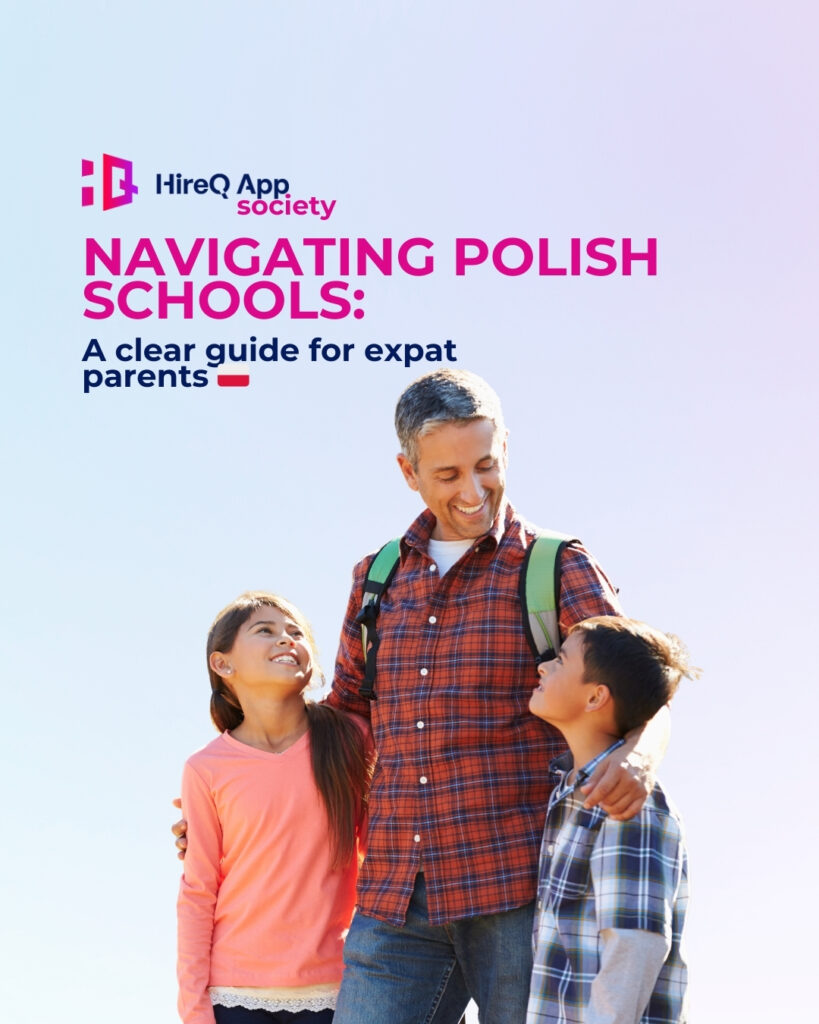
Just moved to Poland with kids?
Welcome — you’ve landed in the right place!
Choosing and enrolling a child in school can feel confusing at first, especially in a new country. This guide will walk you step by step through how to register your child, understand the Polish education system, and find support for foreign students.
🧭 1. Quick Overview — Ages & School Types
Primary school (szkoła podstawowa):
For children aged around 7 to 15 (some start at 6 depending on readiness).
Focuses on general education — reading, math, Polish, science, art, and physical education.
After primary school:
Students continue to secondary/high school, choosing between academic or vocational paths based on interests and goals.
You can choose between:
Public schools – free and funded by the government
Private / International schools – paid, often with bilingual or English-language instruction
📝 2. How to Enroll — Step by Step
1️⃣ Choose a school
For public schools, your child is usually assigned to one in your local area (district school).
You can also apply to other public or private schools if you prefer a different location or language program.
2️⃣ Collect required documents:
Child’s passport or ID
Proof of address (rental contract or residence registration / meldunek)
Birth certificate (translated if not in Polish)
Previous school records or transfer certificates (if applicable)
3️⃣ Apply
Contact the chosen school or your local Education Department (Wydział Edukacji / Urząd Miasta).
Many large cities (like Warsaw, Kraków, or Wrocław) have special help desks for foreign residents.
Complete the registration form — some schools may invite your child for a brief interview or language placement check.
4️⃣ Confirmation
Once accepted, the school will confirm the start date, provide details about uniforms (if needed), and share the class schedule.
💡 Tip:
If you don’t yet have proof of address, contact the school or city office — many schools assist newcomers with temporary arrangements.
📄 3. Documents & Practical Requirements
Registration proof (zameldowanie): Helpful but not always mandatory at first — check locally.
PESEL number: Makes administration (banking, healthcare, school records) easier, but not strictly required to begin school.
Translated school records: Use a sworn translator if possible — it helps schools quickly recognize previous grades and coursework.
💬 4. Support for Foreign Children
Polish schools are becoming increasingly welcoming and supportive of international students. You can expect:
Polish as a Second Language (język polski dla obcokrajowców) classes
Integration or teaching assistants who help children in lessons
Counselling and psychological support for adjustment challenges
Catch-up lessons (“zajęcia wyrównawcze”) in core subjects
🏫 Example:
Many schools in Warsaw and Kraków run beginner or language-support classes (“0 classes”) for newly arrived children. Ask the school about special programs for foreign students.
⚖️ 5. Public vs Private Schools — Quick Comparison
| Feature | Public School | Private / International School |
|---|---|---|
| Tuition | Free | Paid |
| Language | Mostly Polish | English or bilingual |
| Curriculum | National | International / mixed |
| Support | Local integration help | Smaller classes, personalized learning |
| Best for | Long-term residents | Short-term expat families or frequent movers |
💡 6. Practical Tips for Expat Parents
✔ Contact your local Education Office (Wydział Edukacji): They’ll give you official school lists and step-by-step local guidance.
✔ Bring translated documents: Saves time and avoids misunderstandings.
✔ Ask about language support early: Many schools have dedicated Polish-language programs.
✔ Start routines before school starts: Practice routes, morning schedules, and meals.
✔ Join expat parent groups: Facebook or community centers often organize meetups and share valuable firsthand tips.
🧩 7. Where to Get Help
🏛 Municipal Office / Wydział Edukacji: Official lists and registration information
🏫 School Secretariat (Sekretariat Szkoły): Forms and enrollment assistance
🌍 NGOs & Migrant Centers: Free Polish language and cultural adaptation programs for children and parents


